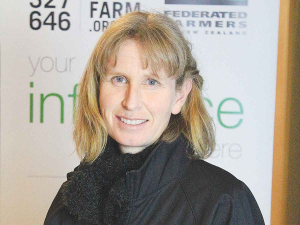M.I.A.
OPINION: The previous government spent too much during the Covid-19 pandemic, despite warnings from officials, according to a briefing released by the Treasury.
 Waikato Federated Farmers president Jacqui Hann says contingencies are needed as it’s highly likely that everyone will become either a close contact of, or contract, Covid-19.
Waikato Federated Farmers president Jacqui Hann says contingencies are needed as it’s highly likely that everyone will become either a close contact of, or contract, Covid-19.
Rural communities have been told that vaccination and planning are the best defences against Covid- 19 causing disruptions on farm.
The Waikato Rural Support Trust is urging rural communities to get their boosters to help prevent possible disruptions to meat processing, work forces and the wider supply chain, particularly at a time when the dry weather has been already testing the agricultural sector.
Waikato Federated Farmers president Jacqui Hann says contingencies are needed as it’s highly likely that everyone will become either a close contact of, or contract, Covid-19.
“Focus on planning ahead for supplies as Covid continues to play havoc with supply chain logistics.
“If we get sick, we may not be able to work, some for a longer time than others, and in critical situations we might end up in hospital. Being prepared will put us on the front foot.”
Ohinewai farmer and group chair Neil Bateup points out that the need to self-isolate will bring challenges to farming families and their businesses.
Bateup, who also chairs the national Rural Support Trust, says it is important to think and talk to family and neighbours in the event of an outbreak on the farm.
The Rural Support Trust has been working with district health boards, Ministry of Social Development and Ministry for Primary Industries, with input from various agricultural industries, Waikato Civil Defence Group and Auckland Emergency Management as part of the Waikato Primary Industries Adverse Event Cluster, to plan how best to support rural communities during Covid-19.
Bateup says if a farmer or a grower contracts Covid-19 they will be asked, by their respective DHB, if they would like to be referred to the Rural Support Trust for support.
“We encourage you to allow this referral, and don’t hesitate to make contact if there is a need. We can tailor support to suit your needs and listen to any concerns you may have. We can also help navigate challenges and utilise the network across agencies where needed.
“Our rural communities will need to come together and support each other as Covid-19 spreads,” says Bateup.
The Waikato Rural Support Trust has facilitators who are rural people and work with industry bodies and partners to navigate, support and help access relevant practical information, advice and support to the rural community. Its services are confidential.
The Waikato Primary Industries Adverse Event Cluster covers the South Auckland and Waikato regions and was set up in 2016 to bring together agencies from the primary industries, central and local government to prepare for and coordinate responses to adverse events.
Contact numbers and resources for farmers: www.rural-support.org.nz or 0800 787 254.
The sale of Fonterra’s global consumer and related businesses is expected to be completed within two months.
Fonterra is boosting its butter production capacity to meet growing demand.
For the most part, dairy farmers in the Waikato, Bay of Plenty, Tairawhiti and the Manawatu appear to have not been too badly affected by recent storms across the upper North Island.
South Island dairy production is up on last year despite an unusually wet, dull and stormy summer, says DairyNZ lower South Island regional manager Jared Stockman.
Following a side-by-side rolling into a gully, Safer Farms has issued a new Safety Alert.
Coming in at a year-end total at 3088 units, a rise of around 10% over the 2806 total for 2024, the signs are that the New Zealand farm machinery industry is turning the corner after a difficult couple of years.
OPINION: Media reports say global recalls tied to cereulide toxin contamination in milk-based nutrition brands could inflict combined financial losses…
OPINION: It's a case of a dairy company coming to the rescue of a failed plant-based dairy player.